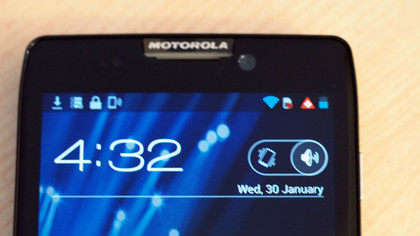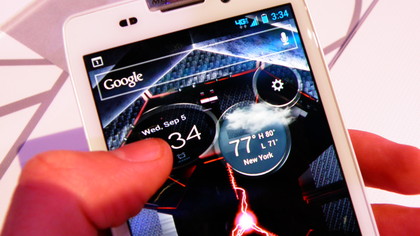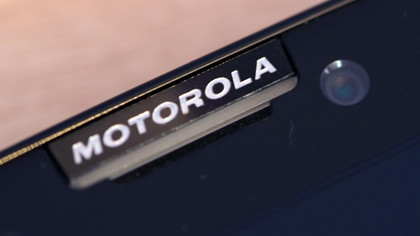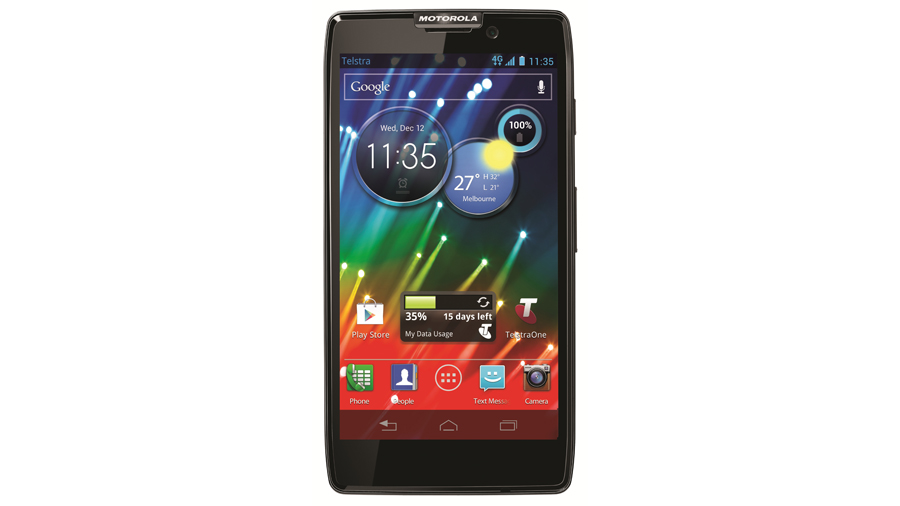Why you can trust TechRadar
The Razr HD's screen is its most significant gain over its predecessor, the original Razr. By going edge-to-edge, Motorola has bumped up the screen size from 4.3-inches to 4.7 without making the handset any longer. To keep up with its neighbours, the resolution has been increased from 960 x 540 to 1280 x 720, earning that HD moniker.
It's a Super AMOLED multitouch display with 312ppi. It does wonderful things with colours, making bright hues come off super-saturated and beautiful. Dark tones are equally strong, with blacks that are deep and dead of night dark. We've said before that the Razr HD is distinctive, these high contrasts are yet another way Motorola's new device stands out from the competition (though whether it's actually "better" is debatable).

Gorilla Glass keeps the display safe from nicks. Walking around town, we let it hang out in our pocket amongst keys and change, and it emerged with nary a scratch. Best of all, since the display is edge-to-edge with only a thin aluminum bezel, it gives the whole face a smooth, premium feel.
Using the Razr HD outside in sunlight is generally no problem. On your average sunny day the screen is almost as visible as it would be in even indoor lighting. Of course, seriously intense sunlight will wash out the display, but no more so than other devices.

When it comes to choosing the best screen, a lot of it comes down to personal preference, not ppi. In our mind, the HTC One X+ is still king in this category. While the amped-up contrasts of the Razr HD are glorious, they're also over the top. The One X+ offers more true to life colour representation, also on a 4.7-inch display.
When comparing the iPhone 5's retina display, screen size is a big issue. Apple's phone has a 4-inch screen, while the Razr HD is 4.7-inches. People who play many games or spend a lot of time watching videos on their phone will likely appreciate the additional visual real estate. Still, there is something to be said for a shorter screen. Those who value ease of use above all will find an iPhone 5, or Razr M, easier to manipulate with just one hand.
Finally, the Optimus G might be the best phone we've seen for reading text on the web or in e-books. It displays text that's slightly sharper, on a screen equal in size to that of the Razr HD.

Also, the Optimus G and Samsung Galaxy S3 both have nifty face recognition technology that keeps the screen from dimming while you read it. The Razr HD lacks this feature, and while we never struggled with the dim timer, face recognition makes the Optimus G and Galaxy S3 superior reading devices.
To summarise, the Razr HD has a big, durable edge-to-edge screen that stands among the best displays available. The high contrast colour it conveys adds to the distinctiveness of this Motorola handset. It's a massive improvement over the original Razr, but doesn't really outshine any current phones in its price range.
Obviously, it's a better screen than what you'll find on the more compact and affordable Razr M, but that's offset out by an overall smaller form factor and lower price.
Again, it comes down to personal preference. We personally liked the high contrast shades it offered. The pre-loaded backgrounds do a fantastic job of showing off just intense colours can be on this phone. They're striking to look at, especially against the simple black or white body of the phone and it's minimalist face.
